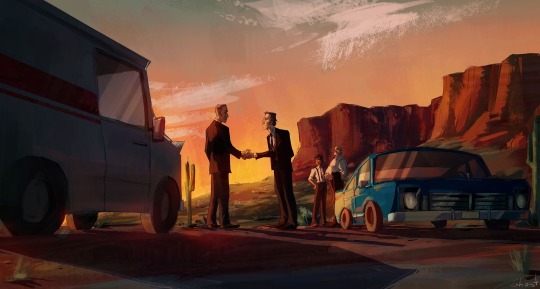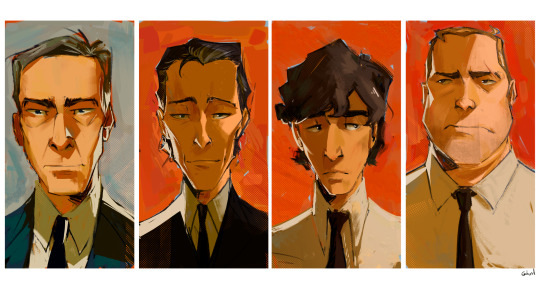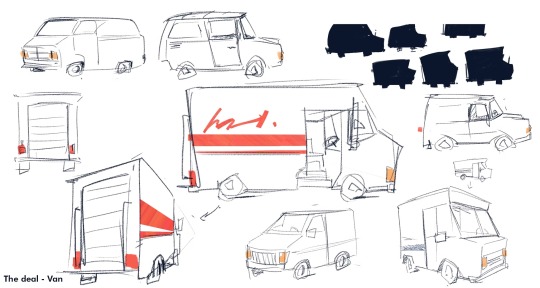#made it as a homage to 70s/80s mafia films
Text




the deal
#realized i dont have anything resembling a project here so here you go#loveeed doing the vehile conceptds#the headshots were done after eveything to give thecharacters more personality maybe ill draw them more#made it as a homage to 70s/80s mafia films#vis dev#character design#artists on tumblr#my art#art#illustration#concept art#visual development#sketch#visual design
95 notes
·
View notes
Photo

Robert De Niro and Al Pacino: 'We’re not doing this ever again' https://ift.tt/33hEQTi

‘Hi guys and girls,” says Al Pacino brightly, making his entrance. He is sporting a veteran-boho look: what seems like about six black cardigans on top of each other, lots of chunky finger jewellery and messy bird’s-nest hair. There may even be one of those two-inch ponytails that were popular in the late 80s in there somewhere – it is hard to see in the general tonsorial disorder.
Next to stroll in is Robert De Niro, who – in dramatic contrast – looks like he has come in from a round of golf: shirt and sports jacket, grey-white hair slicked back. Welcome, then, to the Al and Bob show.
Observing them here, in an intimate room full of selected journalists, you see how their personalities contrast as much as their dress sense. Pacino speaks in a barely audible bass rumble and is not short of waffle; De Niro, while not exactly monosyllabic, spends as much time nodding with his distinctive pursed-mouth underbite and says as little as he can get away with. That is, until we got on to the matter of a certain US president, of which more later.
The pair – the film industry’s equivalent of Mick Jagger and Keith Richards – are bona fide living legends, the greatest US actors of their generation, able to wipe the floor with modern lightweights such as Leonardo DiCaprio, Brad Pitt and Daniel Day-Lewis. Or that is what we would like to believe, anyway. Today, they have rolled into London as the main attraction on the press roadshow for The Irishman, Martin Scorsese’s monumental new gangster picture – and there is a lot to get through. “Wow,” says Pacino at one point, casting his mind back across the pair’s career-long relationship. “We’ve known each other for a really long time.”
For years, The Irishman was little more than a rumour; plagued by delays, distractions and drop-outs, it looked odds-on never to make it out of the starting gate. But, like a wiseguy fitted with a cement overcoat, it has landed thunderously in the middle of the autumn season, blowing away the rest of the awards-bait dross.
The Irishman is the fourth in Scorsese’s series of epic mafia pictures, following Mean Streets, Goodfellas and Casino; it is the latest variant of Scorsese’s reinvention of mob life as an agonised stations of the cross. It is also the wintriest of character studies, contemplating (like Scorsese’s last film, Silence) the approach of death with equanimity. The CGI that Scorsese added to “de-age” his actors, and the deal that the director made with Netflix to fund it, has unexpectedly put his film in the same camp as cutting-edge industry disrupters. Scorsese himself has acquired new cultural currency in recent months: the naked homage/appropriation by the makers of Joker has driven attention to his string of 70s masterworks, while his dismissive comments about superhero movies (“not cinema”) – the first shots in the publicity campaign for The Irishman, as it happens – ignited a social media firestorm that is yet to die down.
Yet, more fundamental than any of this is the sense that The Irishman is a landmark reunion of the old neighbourhood: a last gathering of the clans, a final get-together before age and time overtakes them. Harvey Keitel and Joe Pesci play ageing mob bosses, Pacino is a notorious union boss, Jimmy Hoffa, and De Niro is the Irishman, ice-cold real-life hitman Frank Sheeran. The Irishman turns on the relationship between Hoffa, whose disappearance and presumed murder in 1975 remains unsolved, and Sheeran, a hitherto little-known mob figure who confessed to killing Hoffa, his longtime friend, to the lawyer Charles Brandt, who included it in his 2004 biography of Sheeran, I Heard You Paint Houses. Hoffa and Sheeran provide suitably substantial figures for Pacino and De Niro to renew their on-screen confrontation, most vividly portrayed in the 1995 Michael Man thriller Heat (the 2008 cop comedy Righteous Kill was slightly less memorable).
Pacino says they met in 1968; at the time, Pacino was a firebrand stage actor yet to feature in films, while De Niro was doing wacky avant-garde movies such as Brian De Palma’s Greetings. “Early on in our careers, we connected from time to time and we found we had similar things happening to us,” says Pacino. “Our lives took on a whole different kind of thing.” It was camaraderie, he says, that “got us together”.
Looking back, their acting careers did seem to blossom with a mysterious symbiosis. Both acquired a reputation in their teens as a troublemaker: De Niro spent much of his youth in Little Italy, Manhattan; Pacino, three years older, grew up in the Bronx. Both scored major breakthroughs in the early 70s courtesy of the Italian-American presence in the Hollywood new wave: Pacino as the flint-hearted capo-in-waiting in Francis Ford Coppola’s gangster epic The Godfather in 1972, De Niro as a knockaround guy in Scorsese’s Mean Streets a year later. The two appeared in the same film for the first time, although not together, in Coppola’s Godfather sequel in 1974: De Niro played the young version of Pacino’s father.
Sometimes I feel I know nothing about acting. Until you start. That's what's exciting for me
Al Pacino
Pacino gets a little dewy eyed; he looks a bit like a panda with a secret sorrow. “We’re really close. We don’t see each other very much, but when we do, we found we shared certain things. In a way, I think we’ve helped each other throughout life.” The thought of Tony Montana chewing things over with Jake LaMotta is not an image to trifle with. De Niro nods away, bottom lip almost wobbling, but there is no stopping Pacino. Their off-screen friendship, he says, has fed into their acting; in Heat, he says, “we were at opposite ends”, whereas “we were close” on Righteous Kill. They “had a chance to explore that again” on The Irishman: the relationship between Hoffa and Sheeran, who were friends for years before Sheeran’s betrayal, is the nub of the film. “I don’t think we talked about it consciously. It came relatively easy, as those things go.”
When it is his turn to talk, De Niro is all business. The Irishman, it would appear, is as much his show as Scorsese’s. He explains how he nagged Pesci on to the film, despite him having all but retired: “I said: ‘Come on, we’re not going to do this ever again.’” Sentiment is not his thing. “It was tough enough to get it done, to get the money to do it and everything. I don’t see us putting on a movie like this. I hope we do other films together, but like this? Not likely. This is it.”
Much ink has been spilled over the years on the De Niro-Scorsese axis, as well as the De Niro-Pacino one. But, bizarrely enough, Pacino and Scorsese had never worked together before. For two such high-profile princes of the Italian-American sensibility, that feels like a mistake. “I know,” rumbles Pacino, leaning in and turning worldly-wise. “Like everything in this business, if you’ve been in it for a while, you realise that things get started, but then they go in different places and they don’t always culminate in a film. A couple of times, Marty and I were going to do something together, then they slip away.” He mentions a Modigliani biopic he and Scorsese worked on in the 80s, which they tried and failed to get financed. “Happens all the time.”
De Niro was the key in finally getting The Irishman off the ground. He and Scorsese had been mulling another project about a retired hitman for years, The Winter of Frankie Machine, adapted from the 2006 novel of the same name by Don Winslow. As it was gearing up, De Niro was directing his second film, The Good Shepherd, about the early days of the CIA; that film’s writer, Eric Roth, gave him a copy of Brandt’s Sheeran book as research. After reading it, De Niro took it straight to Scorsese. Just as Frankie Machine was about to get the green light from Paramount, Scorsese did the unthinkable: he walked away and started over again.
More Scorsese films intervened – Shutter Island, Hugo, The Wolf of Wall Street, Silence – before schedules and money aligned and The Irishman could start shooting. For half a decade, De Niro says, the only relic of the film was a now-legendary table read in 2012, “just to have it documented so it could be shown to anybody who was interested”. Every now and then, De Niro says, Pacino “would call me and ask: ‘Is it happening?’ I’d say: ‘Yeah, yeah, it’s happening.’ But it took a long time.”
So long, in fact, that they started to get too old to play their roles as originally conceived. Both actors are well into their eighth decade: Pacino is 79, De Niro 76. Scorsese had been clear that he did not want to use different actors for their middle-aged selves, who dominate the film’s scenes. Enter the “de-ageing” CGI technology. “Netflix came in and paid for the process,” De Niro says. “It helped us all along.”
Did they get the willies confronting their younger versions? Sheepish guffaws ensue. “What do you think?” asks De Niro. “Don’t we all?” replies Pacino. Do they still enjoy the job? De Niro is pithy: “It’s different, but I like it just as much.” Pacino goes long: “It sort of depends on what you’re doing,” he says. “I hate to say it, but you can go 20 years between inspirations.” He stops for a moment, baffled by his own eloquence. “Bear with me – I’m going through the bushes here and I’ll come out with something.” He says he is always on the lookout “to find something that you really connect to, you really want to do”. A lot of the acting he does is “work-rest”, he says, so he can “get back to looking around and seeing what’s out there”.
We have a gangster president who thinks he can do anything he wants
Robert De Niro
De Niro nods along furiously. Pacino is in the groove. “Sometimes I feel I know nothing about acting. Until you start. That’s what’s exciting for me. A new character. I often say: ‘Desire is more motivating than talent.’ I’ve seen people with great desire take it through. The truth is, it’s the same thing that is always was: you are feeling this new character, this new person, this new story.” As he grinds to a halt, Pacino looks pleased: he has come out with something all right. It is a great manifesto for a living legend.
As the encounter starts to wind down, one big question – arguably the biggest – remains unasked. If it is about anything, The Irishman is about the gangsterisation of US politics, how the Cosa Nostra exploited opportunities to corrupt the electoral process and organised labour. Two big killings – those of John F Kennedy and Hoffa – are characterised as the outcome of mafia intervention in the political sphere. Some might say the US is still living with the legacy; as De Niro’s version of Sheeran likes to say: “It is what it is.” De Niro has a record on this: we know he hates Trump and has called him out time after time. But the way he suddenly takes over the room is amazing to behold: eyes like gun-sights, he gives Trump both barrels. “We have a real, immediate problem in that we have a gangster president who thinks he can do anything he wants.” De Niro is livid; Pacino knows to keep quiet. “If he actually gets away with it, then we all have a problem. The gall of the people around him who actually defend him, these Republicans, is appalling.” He does not call Trump a “mook”, but he may as well have.
Instead, he has a message for the press: “It’s a resentment of people like you guys, writing about what you see is obvious gangsterism. They don’t like that, so they say: ‘Fuck you, we’re going to teach you people.’ And they have to know they’re going to be taught.” This is De Niro unfiltered, and it is thrilling to experience it at close quarters. Does he think Trump will go to jail? “Oh, I can’t wait to see him in jail. I don’t want him to die. I want him to go to jail.”
And with that the Al and Bob show closes. De Niro abruptly resumes his affable persona and says goodbye; he and Pacino are swiftly escorted out. Trump – we can but hope – is quaking in his boots. But The Irishman roadshow rolls on. It is what it is.
The Irishman is released in UK cinemas on 8 November and is on Netflix from 27 November
3 notes
·
View notes